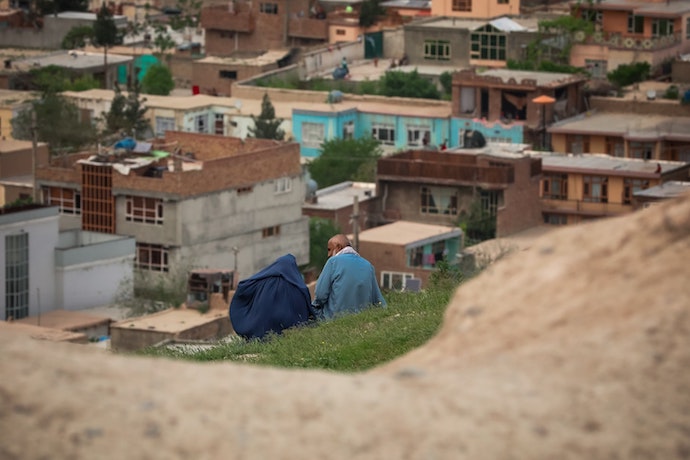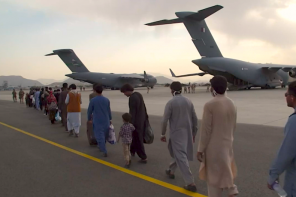Twenty years ago, in the immediate aftermath of the September 11th attacks, President George W. Bush unleashed what he termed the War on Terror that reoriented the geopolitical security paradigm forever. In its wake, the Department of Homeland Security and, under it, Immigrations and Customs Enforcement (ICE), were established and the longest-running war in US history began in Afghanistan.
Since then, as the chaotic withdrawal of the US military from Afghanistan has shown, one of the primary lessons learned is, indeed, how little has been learned in the interim. Moreover, America’s failure on multiple fronts, from nation-building to counterterrorism, has immediate implications for American citizens on US soil, too.
Instead of reassessing the danger of hubris in the misguided and half-hearted attempt to transpose an American style of federal governance on a nation that prides itself on local bonds and tribal connections, Afghans themselves were sidelined and prevented by the US military industrial complex from asserting their own ideas and desires for the present and future of their country.
US officials prioritized their own political preferences colored by the greed of war in a trillion-dollar mineral-rich nation instead of exercising cultural competency and a sincere desire to build a sustainable infrastructure. Afghanistan is one of the poorest countries in the world according to the UN index. Yet, as reported by John Sopko, the Special Inspector General for Afghan Reconstruction (SIGAR) appointed by President Obama in 2012, the US wasted billions on cars and poorly constructed buildings that quickly fell into disrepair. The misappropriated and misspent billions of American taxpayer dollars spent on the military campaign achieved no discernible goal and helped nobody, especially not Afghans.
The devastation of Afghanistan in the aftermath of the US-led invasion may seem like a problem best left to history. However, by evading the central issue of Pakistan’s involvement in the creation and fortification of the Taliban, the US is now forced to negotiate and potentially collaborate with the Taliban, who have taken over the government in Afghanistan.
The Taliban are the outcome of Pakistan’s intelligence service, the ISI, and America’s Operation Cyclone, that resulted in Osama bin Laden’s rise to prominence and ultimately, the development of al-Qa’ida, the same militant Islamist organization whose acts of terrorism on 9/11 propelled the United States into a protracted and deadly conflict in Afghanistan to begin with. The tragedy that is Afghanistan was avoidable from the beginning had the United States regarded Afghans as human beings rather than pawns in a decades-long proxy war which preceded 9/11.
As the current status of the Taliban makes clear, military might has not been—and will not be—an effective primary tool to achieve national security in Afghanistan and in many other nations in which the war on terror continues to be waged in all but name. As Afghanistan has shown, if the interlocking systems of education, women’s rights, and local economies had been sincerely bolstered through local partnerships, the factors that led to militancy and rural support of the Taliban would have been directly confronted.
Cessation of US-led armed drone strikes would have stemmed the grievances that led to support of the Taliban with their anti-American and anti-imperialist propaganda. The drone strikes have killed a minimum of tens of thousands of Afghan civilians. Moreover, in the past several years, the majority of Afghans, in large cities and in the further reaches of the landlocked country, genuinely believed in and supported progressive values, like women’s rights, and institutions, like a free press. This support by Afghans was never met with like-minded support from Americans or allies.
A generation of Americans has grown up never knowing life before September 11, 2001. So, too, has a generation of Afghans grown up under the specter of war and drones overhead. There are certainly casualties of the decades-long war on all sides. Tens of thousands of Afghan soldiers and police personnel have been killed in the line of duty protecting Afghan civilians against the Taliban onslaught in the past two decades. 2500 American servicemembers have also lost their lives in service of their country in Afghanistan. Afghans and Americans alike bear the physical and mental wounds of war.
Perhaps the only lesson that has been learned has had too steep a price.
To prevent ongoing devastation in the current landscape of perpetual warfare, and so that whatever formulation the presence of the US military eventually takes in Afghanistan is more thoughtful in its approach, the United States must learn the most important lesson of all: that the civilians and citizens of other nations have more similarities to Americans than differences, and are human beings after all.





